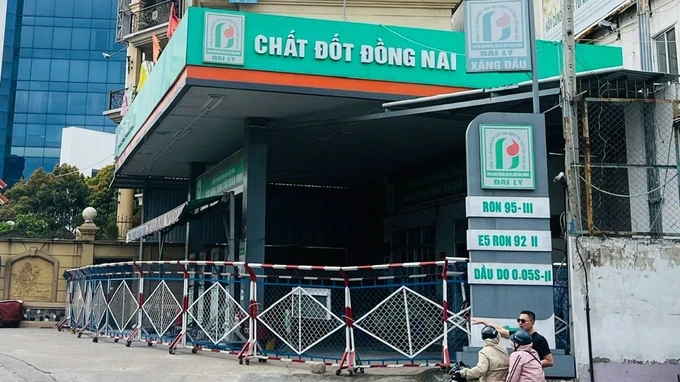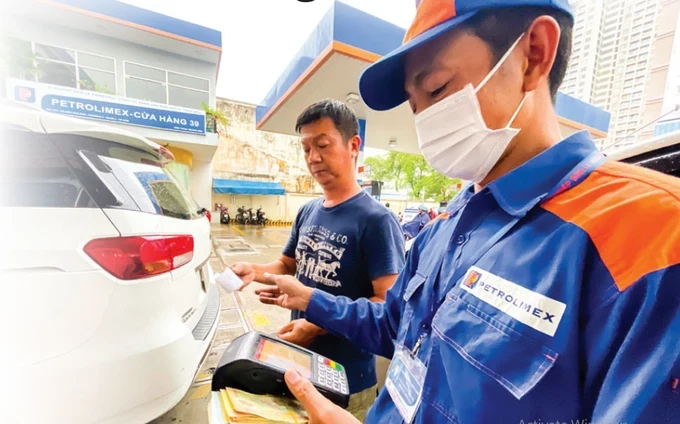Small fuel businesses struggle under new government regulations
Vietnamese fuel retailers are concerned about new regulations that they believe are discriminatory and will harm small businesses.

Looking at a petrol station on Cong Hoa Street (Tan Binh District of HCMC), which is currently closed, the owner sighed and lamented the dire state of the industry. Once a lucrative business, the number of petrol stations closing has been increasing. Despite owning nearly a dozen stations and a storage system, his company is struggling to break even.
Facing a tougher situation is Director Nguyen Thi Sinh of Chien Thang Petroleum Co. (Yen Bai Province), who revealed that four out of her company's seven stations were severely damaged during Typhoon Yagi, with documents and records being washed away. She estimated the losses at around VND10 billion (US$407,500) and stated that the company is currently assessing the damage and undertaking repairs.
At a meeting with the Ministry of Industry and Trade on September 18, several fuel businesses reported facing numerous difficulties and predicted a surge in closures by the end of the year. This is attributed to stagnant consumer demand, significant losses from Typhoon Number 3, and sharply declining fuel prices coupled with extremely low wholesale discounts.
Statistics from the Ministry of Industry and Trade show that the number of primary wholesale fuel traders decreased by two in the first eight months of 2024. In the first quarter of 2024, plus a total of 1,065 petrol stations nationwide ceased operations. HCMC alone saw the closure of 34 petrol stations during the same period.
To address the shortcomings in the fuel market and support businesses, the Ministry of Industry and Trade has drafted a new decree on fuel business to replace Decrees 83/2014/ND-CP, 95/2021/ND-CP, and 80/2023/ND-CP. However, after four drafts, many concerns remain unresolved.

According to Chairman Van Tan Phung of the Board of Directors of Dong Nai Petroleum Trading JSC., fuel businesses are facing unequal treatment. In reality, for many years, a single enterprise has dominated the market with a 51-percent market share, holding all the rights of a primary wholesale trader and having a distribution system that extends from imports to secondary wholesale (fuel distributors) and retail sales to end-consumers.
Along with this are six large enterprises, also acting as primary wholesale traders, account in total for 88 percent of the market share from imports to wholesale and retail sales. This situation does not reflect a truly competitive fuel market with fair and equal conditions.
Phung argued that the draft decree continues to distinguish between six types of traders, while in reality, they all belong to the same fuel business sector. Similarly, the regulation on five types of business licenses is essentially equivalent to five sub-licenses corresponding to five fuel business activities.
Furthermore, the draft requires primary traders to have dedicated ports capable of receiving oil tankers or other fuel transportation vessels with a minimum deadweight of 7,000 DWT; and to have a total storage capacity of at least 15,000 cubic meters. It also stipulates that primary traders must have at least 10 retail outlets and at least 40 retail traders, while distributors must have at least 5 retail outlets and at least 10 retail traders.
These constraints make it difficult for businesses, as Van Tan Phung believes that businesses should be able to organize their operations independently and that the government should not intervene to this extent.
Meanwhile, Chairman Nguyen Van Leo of the Board of Directors of HCMC Transportation JSC. emphasized the need for the government to create a stable business environment and support small and medium-sized enterprises. A healthy competitive environment will stimulate economic efficiency and benefit consumers. Businesses that violate the law should be held accountable.
Hoang Trung Dung, former general director of the Petroleum Additives and Products Development JSC., suggested that to ensure transparency and competitiveness in the fuel market and positively impact pricing, the government should allow the establishment of a fuel trading floor. The Ministry of Industry and Trade should review the draft decree to amend and supplement the regulations on fuel trading through the Vietnam Commodity Exchange.
Director Nguyen Xuan Thang of Hai Au Phat Co. Ltd. (Lam Dong Province) questioned why, despite domestic production of a portion of the fuel supply, only primary traders are allowed to purchase from domestic producers, while fuel distributors are not.
The draft decree also stipulates that primary traders can buy and sell from each other, including from other primary traders, but distributors can only buy from primary traders and sell to each other. This regulation makes it even more difficult for small businesses.
There is a need for clearer regulations allowing distributors to purchase fuel directly from producers, and retail businesses that are not exclusive or franchised agents should also be allowed to purchase from multiple sources and sell to each other. Additionally, specific ratios should be set for operating costs and profit margins.
Deputy Head Nguyen Thuy Hien of the Domestic Market Department at the Ministry of Industry and Trade stated that the ministry has received feedback from fuel distributors and retailers. The ministry is always willing to listen to the market and will study and incorporate this feedback to finalize the draft decree and submit it to the government for approval as soon as possible.








